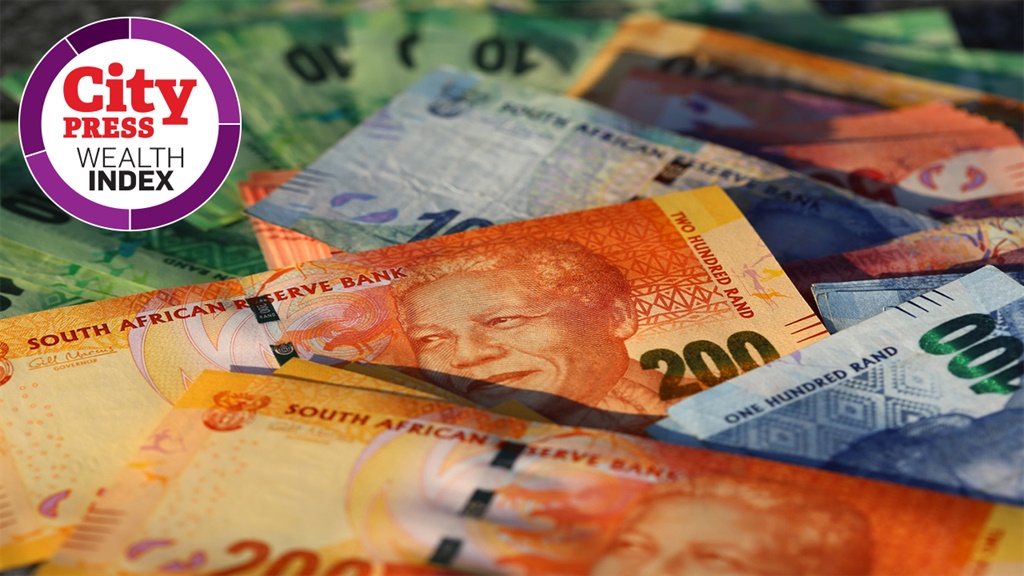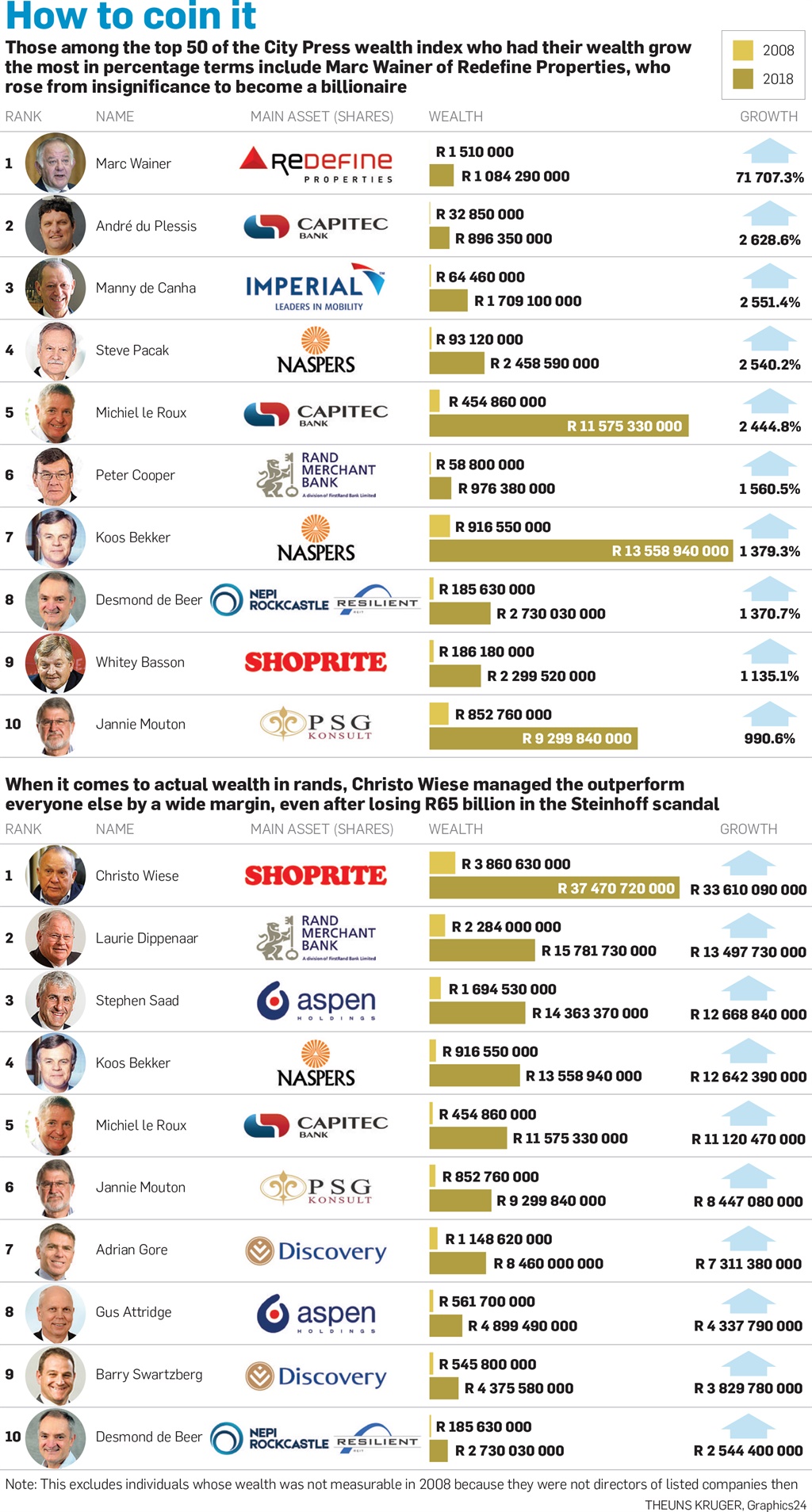
These days you don’t need to own or even have shares in a mine to become a ‘squillionaire’.
The main sources of wealth for most of the corporate elite identified in City Press’ new Wealth Index are banking and property – a sharp departure from a decade ago when being uber-rich in South Africa often meant owning mines.
The number one spot nevertheless goes to Ivan Glasenberg because of his personal 8.3% stake in Glencore, the controversial mining and commodity trading group he founded.
However, in 2008, the corporate elite of South Africa looked very different. It was the last days before the global financial crash, which was also the end of what many people had called a commodities “super-cycle”.
Of the top 50 in 2008 15 people were wealthy because of their stakes in mining or commodity companies, including former platinum boss Lazarus Zim, now President Cyril Ramaphosa, Exxaro head Sipho Nkosi, Mvelaphanda chairperson Tokyo Sexwale and Anglo American’s Nicky Oppenheimer.
In 2018 only three members of the top 50 are there because of mines, including Glasenberg and Assore’s Des Sacco.
This year 17 out of the 50 are there because of financial sector shares.
Capitec and its major shareholder PSG Group are the reason for six of the top 50 making the list, including Capitec’s Michiel le Roux and PSG group’s Jannie Mouton. The FirstRand group accounts for five more, among them Laurie Dippenaar and former FirstRand head Paul Harris. Health funder Discovery accounts for three members of the top 50, most notably CEO Adrian Gore.
The biggest change in the composition of the corporate elite was, however, because of the spectacular rise of an entirely new sector: listed property invesment groups.
Another 11 of the top 50 are there because of shares in property companies, most of which were not on the JSE 10 years ago.
SHOOTING THE LIGHTS OUT
Of those who made the top 50 in 2008 and in 2018:
The most impressive growth in wealth on the index is that of Le Roux, co-founder and 11.5% shareholder of Capitec.
Equally impressive is the fortune of Koos Bekker, consisting of shares in City Press’ ultimate owner Naspers. Bekker was already worth just less than R1 billion 10 years ago. This has increased more than 1 000% to R13.6 billion, making him the seventh-richest man on the index.
In percentage terms, however, the most impressive moneymaker is Marc Wainer, a veteran of the property sector who has led Redefine Properties for almost two decades.
His shares in Redefine and another property company invested in Polish properties, Echo Polska, are worth just more than R1 billion now compared with his modest R1.5 million in shares in 2008 – a 71 707% increase.
In terms of real money Christo Wiese comes out tops, despite losing R65 billion in the Steinhoff fiasco.
His R37 billion fortune now is still 10 times his 2008 tally of R3.8 billion. Most of this consists of a 17% share in Shoprite.
Half of the top 50 would not have shown up in 2008 despite already being very rich, because their companies were not yet listed or they weren’t yet directors. This includes the number one, Glasenberg, as well as number five, Dischem founder Ivan Saltzman who is worth R15.8 billion after listing the retailer/pharmacy group on the JSE in 2016.
Motsepe, however, personifies the shift from mining to finance. In 2008 he had a R22.7 billion fortune consisting almost entirely of his shares in African Rainbow Minerals, which he built up with old gold mines he bought from Anglo American in the late 1990s.
But in 2018 Motsepe has an entirely different fortune that is coincidentally also worth R22 billion. It consists mostly of the 7.4% of Sanlam he owns.
Motsepe is building up his African Rainbow Capital as a black-owned force in the financial sector.
The second-wealthiest black man on the list is Jayendra Naidoo, who made 30th position with a little help from the Public Investment Corporation (PIC).
Naidoo was the “key man” in what the PIC internally called Project Blue Buck – funding Naidoo’s Lancaster Group to acquire 8.77% of Steinhoff Africa Retail (Star). A quarter of this, worth R1.6 billion, is attributable to Naidoo.
Star is the mostly intact part of the imploded Steinhoff International that was separately listed on the JSE last year. It consists largely of Pep and Ackermans stores.
THE BANKERS
Two cliques in the banking sector account for more than 25% of the top 50.
One is tied to Capitec, one of the most spectacular success stories in corporate South Africa. Its founders and early investors have been handsomely rewarded.
Right next to co-founder Le Roux in 10th position is Mouton who occupies the 12th spot with his 22% stake in the PSG Group worth R9.3 billion. PSG is the major Capitec shareholder and derives most of its value from the low-cost bank.
PSG’s co-founder Chris Otto is in 36th place on the index with R1.2 billion.
Capitec’s CE and chief financial officer Gerrie Fourie and Andre du Plessis, respectively, are 49th and 50th on the index. Each has Capitec shares worth about R900 million.
The second banking clique comprises the founders of FirstRand, which includes RMB and FNB.
Laurie Dippenaar is fourth on the index with shares in the group worth R15.8 billion. Co-founder Gerrit “GT” Ferreira is 16th with R4.9 billion. Pat Goss, the third part of the original team that founded the precursor to RMB in 1977, called Rand Consolidated Investments, is at number 21 with assets of R2.5 billion.
Harris, who joined in shortly afterwards, is number 26 with R1.7 billion.
Peter Cooper, who joined the gang in the early 1990s, is number 48 with R976 million.
PROPERTY
The past decade has seen a spectacular increase in property company listings on the JSE, leading to the sudden appearance of several property moguls in the top 50.
John Whittaker owns 27% of Intu Properties, a UK shopping centre investment company that listed on the JSE in 2013.
This stake is worth almost R13 billion, putting Whittaker in ninth position on the index.
Richard Herring owns 87% of Heriot, a real estate investment trust that owns a number of South African industrial sites, shopping centres and office parks. He is worth R2.4 billion.
Des de Beer, executive managing director of Resilient, another real estate investment trust company, is worth R2.7 billion.
TALK TO US
How do you feel about the accumulation of wealth in the past 10 years? How do you feel about the fact that there are no women or black men on the list?
Comment below or
Use the hashtag




 Publications
Publications
 Partners
Partners









